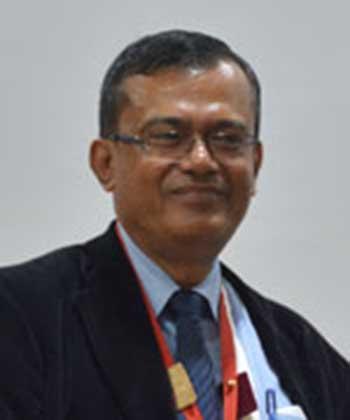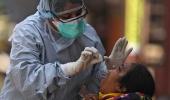'Premature lifting of the lockdown will spread the disease from asymptomatics, and those undetected, to the whole community, ushering in prolonged misery, preventable and avoidable deaths, famine and social unrest,' warns Dr Debashish Danda.

I am disappointed by the passive, fatalist approach by the proponents of herd immunity.
Prime Minister Narendra Damodardas Modi said it much better: Every life matters.
Developing herd immunity by killing many is not the best option here.
Herd immunity by natural infection may be good option in polio, smallpox and mumps.
In such diseases, herd immunity during a pandemic is the best way.
In the 1918 Spanish Flu pandemic, that lasted three years, it killed 20 million people out of less than 300 million people of undivided India alone then.
Globally it killed between 50 and 100 million people.
It was brought into India by British soldiers travelling by ship from England.
Like influenza, coronavirus is a disease with highly variable surface proteins due to mutations of its strains.
The flu vaccine, in every year, is freshy made, because of such changes; it used to be called 'antigenic shift and drift' during our MBBS days.
Moreover, infectivity in COVID-19 is the highest known to mankind ever, therefore it is likely to have a very high R0 and as the health ministry said, one positive case from a Delhi cluster had infected up to 405 people.
Higher the R0, higher is the HIT (herd immunity threshold).
In polio and smallpox with R0 between five and seven, 80 to 85 per cent of the population must get naturally infected or vaccinated to generate herd immunity in a community.
These diseases now have vaccines.
But before that it took almost 100 years to eradicate them by herd immunity.

But these diseases don't kill that many, so it was somewhat okay to wait to have herd immunity even by natural infection.
Ebola and flu have Ro between 1 and 2 with HIT between 30 and 50 per cent.
It means, if 30 to 50 per cent of the population gets infected, the community gets herd immunity.
They have fairly high mortality too.
But with so high infectivity and 10 times higher mortality than flu, with no drug or vaccine at least for next 18 months, COVID-19 is likely to have high HIT, may be 100 per cent.
That means 100 per cent population must get infected, before herd immunity develops.
If 100 per cent Indians are infected by letting it loose, it will kill 60 million to 70 million Indians within next two months, with a 5 per cent mortality.
Is it not senseless to allow this to happen?
People who are 50 plus, with hypertension, diabetes, heart/lung disease would constitute 80 per cent of COVID-19 deaths, who would not have died otherwise.

Breaking the chain by prolonged lockdown, targetting, tracing, testing, isolating and treating positive cases, following all hand hygiene steps, wearing of masks by all (simple, double-layered, homemade cloth masks that are not shared with anyone, soap washed, disinfected and sundried will do).
The COVID-19 virus is a large-sized virus that cannot enter through a double-layered cloth mask and you don't need N95 masks for everyone in the community, except the frontline staff dealing with COVID-19.
That and physical distancing (with social closeness maintained via phone/social media) wearing glasses and cough/sneeze/no spitting etiquette can save lives, by breaking the chain.
Quarantined people also should not be exposed to each other, as no one knows who will turn out to be positive in two weeks.
In India, anyone coughs and sneezes anywhere without covering their face and without any warning, Therefore, a mask is a must.
Non-stop minimum eight weeks of strict lockdown is recommended by mathematical modellers, considering up to two weeks of incubation period and six weeks of viral persistence in human body.
 IMAGE: Dr Debashish Danda
IMAGE: Dr Debashish DandaThe covid viral particle does not live forever and unless it is transmitted to another human host, it meets its dead end, by this period in most, if not all.
Family members at home should identify people with cough, fever, breathlessness to be subjected to tests, and if positive, isolated, treated and contacts quarantined.
Eight weeks lockdown can end virus multiplication in most asymptomatic carriers too, except in some cases, where the virus may have unusually higher incubation period and longer viral persistence in the body.
That is rare and hopefully they will acquire herd immunity.
Breaking the chain by these steps mentioned above is, therefore, the most economic way and lifesaving.
It will be barbaric to let people die to render herd immunity to society.

Regarding the economy, it is shortsightedness to lift the lockdown prematurely.
Singapore had a resurgence after two weeks of lifting a short lockdown.
Vietnam controlled it well by strict measures.
The economy will get ravaged if the lockdown is prematurely lifted (anything short of eight to 10 weeks).
On the other hand, a strict lockdown along with testing and isolation will save us in a much better way.
If we follow strict, nonstop, 8 to 10 weeks of lockdown, maybe it will peak by May.
By July end, it should come to a state like Wuhan is now, as many predict.
Of course, lifting of the lockdown has to be gradual, graded and guarded, under close monitoring, so that one can go back to stringent measures if small outbreaks/clusters start reappearing.
Till then no business house should be restless.
It is in their best interest that they feed the poor now and India can feed its people for up to even six months.
After six months and thereafter, the economy will bounce back with some initial slowness.
We can't help it.

Premature lifting of the lockdown will spread the disease from asymptomatics, and those undetected, to the whole community, ushering in prolonged misery, preventable and avoidable deaths, famine and social unrest.
The government must also specially protect farmers by buying their produce and supporting them to continue cultivation; otherwise, food shortages leading to famine in six months is a real possibility.
Farmers, like healthcare workers, sanitation staff and high risk people should be given extra protection from the COVID-19 disease.
If there is no one fit to grow food, it will be another disaster.
The PM must follow correct advice, should continue to be mindful using his best wisdom to pick the right choice in his decision making, uninfluenced by any superstition, crony capitalist pressure etc; and he has already taken a several good steps.
Kerala, Odisha and Rajasthan to some extent, are doing well.

The PM must explore everything before taking a call and must extend lockdown till a nonstop 8 to 10 weeks are crossed, by which time the life cycle of the virus will end in a large majority.
This lockdown period, along with case detection by tests will, therefore, significantly reduce the community load of the virus, which can be easily be handled eventually, apart from saving many lives.
Life is first.
Economy is Priority Two.
If people die by the blunders of our leaders, our economy will spiral into unending misery for years.
Charity and controlling the pandemic to save lives by breaking the chain, is the only economic investment now.
These aspects should not be trashed by short-sighted capitalist economists as wasteful expenses without yielding profit or income.
Ending the pandemic faster without loss of many lives is the only profit or income we can and we should aim for now.
IT IS THE ONLY WAY LEFT NOW.
Dr Debashish Danda is the professor and founder of the department pf Rheumatology and Clinical Immunology at CMC, Vellore. He is currently the president-elect of the Asia Pacific League of Associations for Rheumatology.











